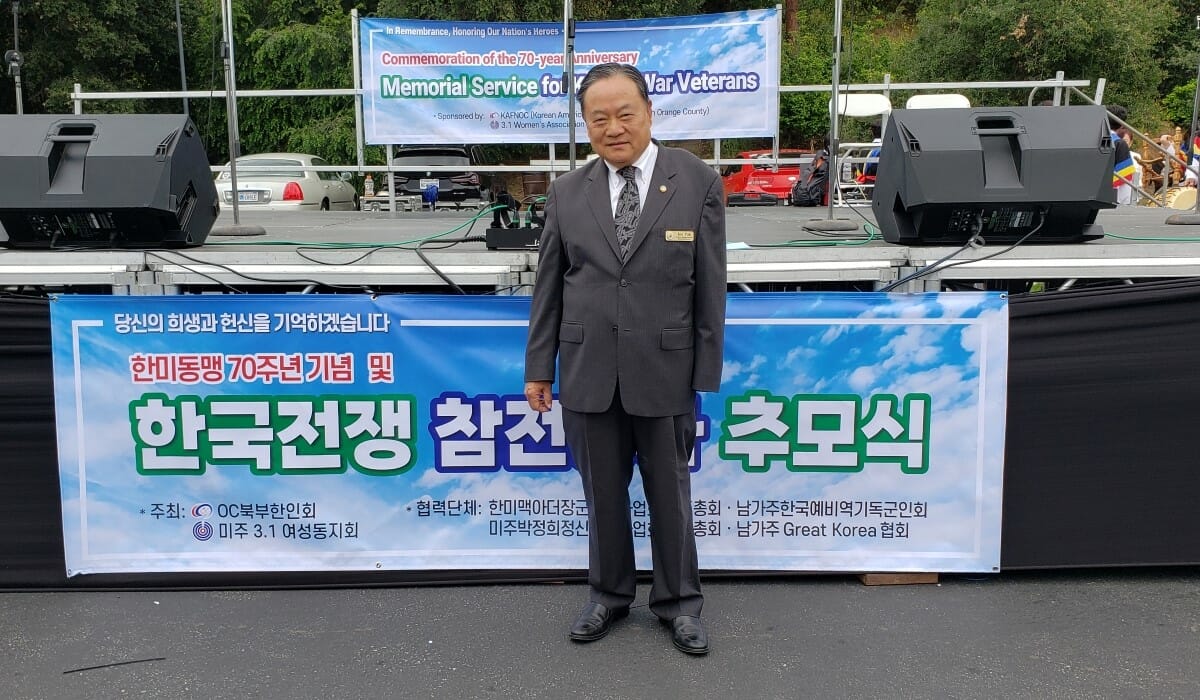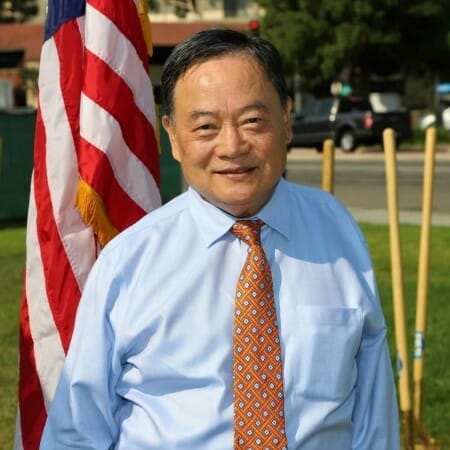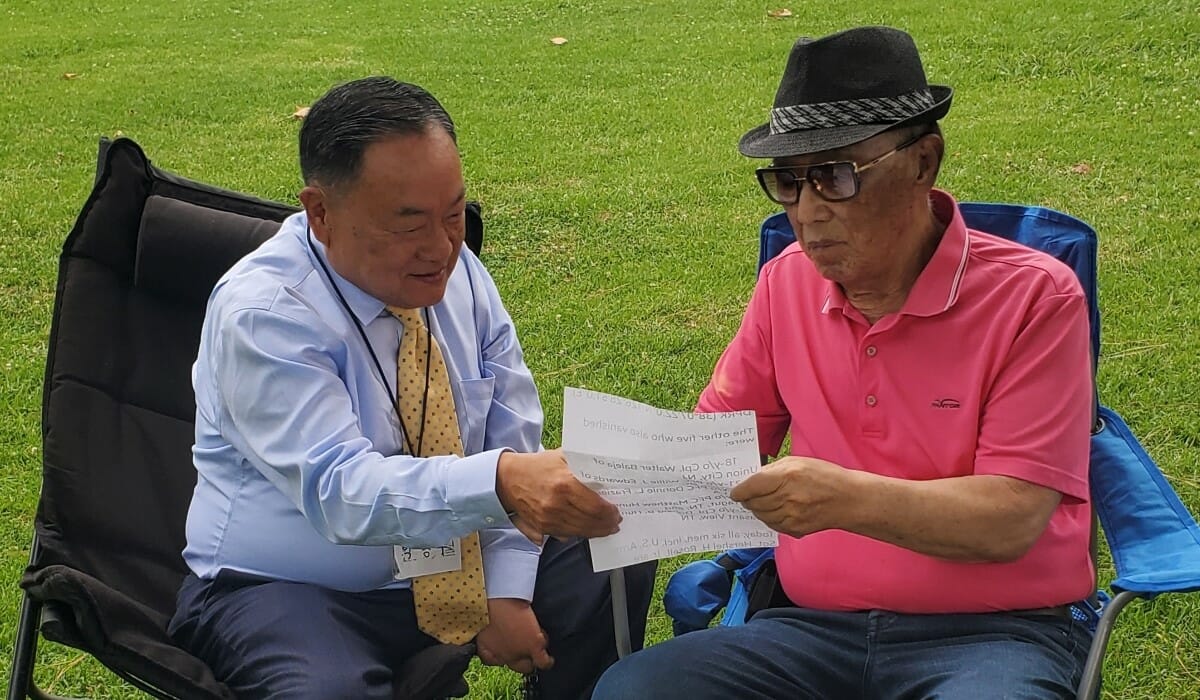Polio Survivor Advocates for the Korean Senior Community

Meet Daily Point of Light Award honoree Dongwoo “Joe” Pak. Read his story and nominate an outstanding volunteer or family as a Daily Point of Light.
Dongwoo “Joe” Pak ran the 1998 Los Angeles Marathon in 6 hours and 12 minutes. Even a young athlete at the peak of their fitness would find the grueling race challenging. Dongwoo was 46 years old and spent much of the week working in an office. He raised $2,500 for the disabled Latino community in the process.
“’Joe, you’re stupid. You just shortened your life by several years by doing that,’” he recalls a friend telling him.
Aside from the other factors at play, Dongwoo is completely paralyzed in his left arm and a bit in his left leg. He is a polio survivor, like his friend, and he lives with the knowledge that post-polio syndrome could further compromise his mobility long after he battled with it as a three-year-old child.
“I always do the best I can while I can and when I can, because I never know when this post-polio syndrome will hit me and I’ll have to depend on other people to take care of me,” he says.
Growing up in Korea with a visible disability, Dongwoo was often picked on. In 1970, when he was 18 years old, he and his family immigrated to the United States where he eventually graduated from University of Southern California. For the next 27 years, he worked for Pacific Bell Telephone Company, now AT&T.
In 1999, well before Dongwoo was a senior himself, Orange County Supervisor Charles Smith appointed him to the Senior Citizen Advisory Commission. Dongwoo cites that perhaps the man made the connection between the disabled population and seniors in regards to the challenges they face, with seniors also experience vision, hearing or mobility loss. It was something Dongwoo had long ago put together, and while he initially started working with Korean American seniors over a decade before, it was then that he was empowered to dedicate his time to the Korean American Seniors Association of Orange County (KASAOC), the organization he has gone on to support and advise for the next 25 years.

One of his proudest accomplishments took three years to bring to fruition but continues to benefit seniors in the area. July 1, 2003, was the launch of the hard-won Senior Mobility Program from Orange County Transportation Authority (OCTA). It’s especially vital to those with limited language skills and struggle to get around on a set-route bus.
“We were not educated in this country, so we need a lot of help from someone who knows English,” says Jin Bang Park, retired engineer and former president of KASAOC who came to the United States in 1972.
The program utilizes two 17-passenger vans that drive people to places like the grocery store, the Korean Community Center and doctor appointments. The original 10-year contract with KASAOC was renewed in 2013 until 2036.
Dongwoo initially learned of the program when he was serving on the Orange County Special Needs Advisory Committee, an appointment he received from the mayor, and spent a lot of time convincing other committee members to award the contract.
“I always tried to take at least 20-25 Korean seniors to big senior events. And none of them really understood what was going on, so I stood in the front and translated for them,” he recalls. “And then, they all said, ‘Oh, yeah, we have language problem.’”
“Our community now has a population of around 100,000,” Jin Bang says of the number of Koreans in Orange County, many of whom face language barriers.
Park, now 80 years old, appreciates the work his old friend has done to benefit the community they share. His four adult children have moved to different states, and he occasionally needs assistance as well.
“Dongwoo helps me, so we spend a lot of hours together,” he adds.
Aside from tackling big projects, Dongwoo is there to advise KASAOC on services available to seniors. He also fundraises, brings in donations and food distributions, and helps individuals with things like recertifying MediCal services.
“A lot of times, when they get the mail, they don’t know what it is. It looks like junk mail, and they throw it away,” he notes. “I always treat them as if they’re my own father and mother. My parents died at a young age, so I didn’t have a chance to interact with them when they got older. But when I go to the Senior Center, I see what their needs are.”
Since 2012, upon her election, Dongwoo has worked with Assemblywoman Sharon Quirk-Silva in a role that he also uses to benefit Korean seniors.

“A lot of times they don’t have the networking connections to the mainstream; they’re kind of living in a silo. I’m exposed to more of mainstream than other people, because I’m working as a senior field rep for the assemblymember,” he cites. “I go to a lot of relevant events.”
One such example is an upcoming Super Senior Saturday event. With the support of the assemblywoman, he is working on creating a Korean version. He’s also able to find corporate funding opportunities and introduce KASAOC leaders to elected officials who can connect them with resources
In 2009, Dongwoo was honored by President Obama with an appointment to the National Council on Disability. During his time working on policy, he helped get rid of sub-minimal wages for the 61 million Americans living with a disability and advised Congress and the Obama Administration on things like the Americans with Disabilities Act (ADA) and special education.
When trying to make change, people in positions of power can often overlook challenges seniors or those with disabilities face.
“They don’t put themselves in another person’s shoes saying, ‘If I were in a wheelchair, what would I need?’” he says. “I’m just happy to be an advocate for the people who cannot speak for themselves.”
After his appointment, he went to Washington, D.C., and visited the Korean War Memorial. He was disheartened that none of the 36,591 American soldiers who died in defense of Korea were written in the stone. It was a stark difference to the nearby tribute to those who died in Vietnam, and he decided to do something about it.
For 12 years, Dongwoo worked out the details of erecting a monument in his home state of California. None of the local cities wanted to give up space in their parks for the project, so he designed something more compact, five stars facing the sky. Each would have 750 names on each of their 10 panels, leaving space for an additional 750 discovered through DNA matching those missing in action.
“I’m so grateful to my boss and her husband. Her husband was the mayor of the city of Fullerton back in 2019, [as was the assemblywoman herself, in 2011]. And they are the ones who gave us that venue,” he says of the site allocated to the project in Fullerton’s Hillcrest Park.
After a lot of hard work and donations from the Korean government and around 400 individuals, it was finally dedicated on Veterans’ Day 2021. Even now, Dongwoo will photograph names for people who can’t get to California to see it themselves.
“It was something that we needed to do to show respect and thank not only the those who gave their all but their parents, relatives and family who lost them during the Korean War. I feel like now I can show up to events with my head up instead of head down,” he says.
After appointments to all levels of government from county to federal, Dongwoo continues to use his expertise as a volunteer. Now a senior himself, he remains vigilant in making sure the senior mobility program runs smoothly and dedicates his time to making life better for the people around him.
“I think you need to always have a bit of discontent. If you’re satisfied with everything, there’s no room to grow. You can always bring something positive to the community if you try hard.”
Do you want to make a difference in your community like Dongwoo? Find local volunteer opportunities.
